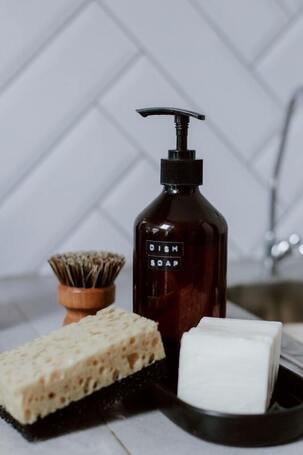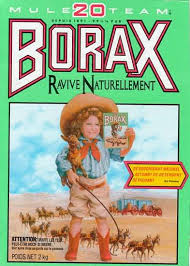
Why I make my own dish soap?
A typical hand dishwashing detergent contains ingredients for cleaning, foaming and substances that allow the detergent to dissolve quickly in water. Other ingredients are associated with preservation, colour, fragrance and anti-irritation. By far the major active component in hand dishwashing detergent is surfactant, which is the main cleaning ingredient for cutting through grease as well as forming suds or foams. Most surfactants are anionic (a negatively charged ion) and are used in conjunction with lauric, myristic and ethanol amides and hydrotopes (the dissolvers) such as propylene glycol (antifreeze) and polyethylene glycol ethers. Some of these chemicals (in some detergents) may possibly be harmful if there is exposure on a continuous and long-term basis.
Propylene glycol—a humectant which means it keeps substances from drying out, was originally developed as an anti-freeze, but is now included in some deodorants, antiperspirants, dish washing liquid, and more. It is a neurotoxin known to cause contact dermatitis, kidney damage, and liver damage. In propylene glycol’s Material Safety Data Sheet, published by the National Institute for Occupational Health and Safety, workers are urged to avoid skin contact with the toxic chemical as it may cause eye and skin irritation, gastrointestinal irritation and discomfort, nausea, headache, vomiting, and central nervous depression.
The next time your standing over vapours of hot soapy water, check the back of your bottle..
I flipped through a few sites with different recipes and picked one for the ingredients that I had at home.
Simply;
2-3 tbsp borax powder ( don't mistake this for boric acid)
1/2 cup of shredded castile soap, Alberta soap works makes some nice unscented bars.
And a recycled dish soap bottle full of hot water.
Then shake it until the grated soap dissolves. Great 3 min whole body work out if you shake it right!
Simple enough, yes??? No...

Borax itself has some irritants, especially to the lungs if inhaled, but the toxicity is quite low and a grown person would need to ingest spoonfuls of it to have any toxic affects (not recommending trying this). Borax is classified as non-carcinogenic but a mild skin irritant. The alkalinity of borax is likely what causes skin irritation (just as excessive use of baking soda would cause irritation). There are also several studies in the ToxNet database that show its only a very mild lung irritant and causes no lasting damage. In addition, it shown that it does not penetrate the skin well, and is not considered to be bio-accumulative. (Meaning, repetitive use over time does not mean it builds up in your system.)
So why the balk about borax?
Recently I've read quite a bit about environmental health and food security. It seems that Borax, while still a natural product, contains boron. Not such a problem in small quantities, it is an essential mineral and is even lacking in some soils in North America. The problem occurs when there is an high accumulation in water ways and it accumulating in the ground water. In turn, making it back to our food supply. High concentration of boron would be detrimental. It also contains a higher level of arsenic that most other products (30 parts per million) which is why it's also an effective ant killer. (please don't kill the ants) I personally don't hold in high regard or quantifiably the studies that found it could lower sperm counts in men and ovulation in women, these studies were data collected for people that worked in boric acid producing factories, and in animal studies where they were administered a solution of boric acid. I do however take heed, and think about alternative options.
Will environmental upset and reproductive havoc happen with all of us home soap makers? Probably not, but knowing that it does have even low levels of toxicity to it, label it well and use it wisely.
Think about and discover better alternatives.
Vinegar is a great whitener/cleaner that can be used successfully to disinfect dishes. Baking soda, and castile soap can also be used in conjunction for scrubbing pots and pans. The best new recipe I've played with is using washing soda instead of the borax.
Washing soda is made from sodium bicarbonate, it is grease cutter, and a great multi-purpose cleaner. Even though it carries the same irritant warning, and low level toxicity if ingested it has much lower environmental impact overall so it's one step closer to being as green as can be. Just be mindful and keep it out of reach of little two and four legged kids.
For a bottle of dish soap use;
1 1/4 cups boiling water
1/4 cup (tightly packed) castile bar soap, grated (should melt by shaking)
- 3 tablespoon washing soda (use a little more for a thicker soap)
Optional would be to add essential oils
Then fill the rest of the container up with water and shake well.
Live clean, be happy.